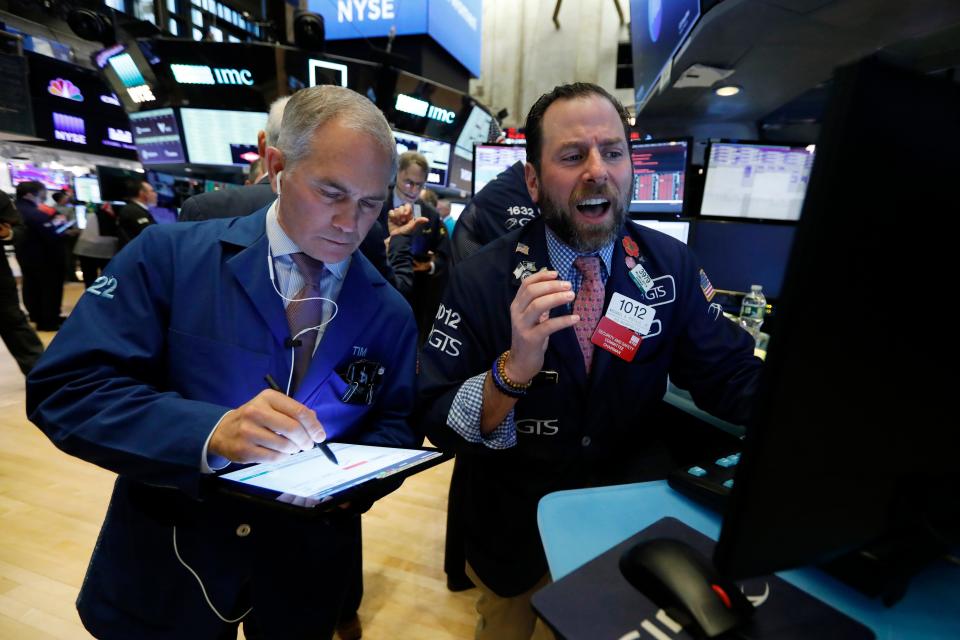Stocks waffle as investors weigh US-China tensions over coronavirus
Stocks recouped early losses Monday as a rebound in big technology stocks calmed investors, who worried about growing tensions between the U.S. and China.
The Dow Jones industrial average was virtually unchanged after briefly dropping more than 360 points. The blue-chip average edged up 0.1% to close at 23,749.76. The Standard & Poor’s 500 eked out a gain of 0.2% to end at 2,842.74. The broad index flipped between small gains and losses for much of the day, as steep declines in energy stocks were offset by gains in technology companies.
Tech firms rebounded after sharp losses in the sector brought U.S. markets down at the end of last week. Microsoft, the biggest company in the S&P 500 index, rose about 2.5%. Tech companies make up roughly a quarter of the index by market value, which gives them sway over the market.
Airline stocks came under pressure after billionaire Warren Buffett said over the weekend that Berkshire Hathaway sold all of its airline holdings in the wake of the coronavirus pandemic. Shares of American Airlines, Delta and United each tumbled 7.7%, 6.4% and 5.1%, respectively.
Get me out of here!: Americans flee crowded cities amid COVID-19, consider permanent moves
Warren Buffett: The Oracle of Omaha tells investors to 'Bet on America,' buying stocks for long-term gain
The recent declines come after stocks posted their best month since 1987 in April. Wall Street has been bracing for a poor showing by companies this earnings season due to the economic shock from the coronavirus. Many companies have pulled their earnings guidance for the rest of the year, citing uncertainty about how much of an impact the outbreak will have on their business and the economy.
Beijing has repeatedly pushed back against U.S. accusations that the outbreak was China’s fault. Investors fear that growing tensions between Washington and Beijing could threaten to undo the truce in a trade war between the two countries that was struck just before China began shutting much of its economy down in late January to fight the pandemic.
The Trump administration threatened to use retaliatory measures against China. Proposals include restricting U.S. government pension funds from investing in Chinese stocks, higher regulatory scrutiny for listed Chinese companies and higher tariffs, according to Lauren Goodwin, economist and multi-asset portfolio strategist at New York Life Investments.
“We think this is more about U.S. politics than about China, but the developments are still important,” Goodwin said in a note. “Restricting investment would be particularly disruptive.”

Bleak trade and manufacturing data are also discouraging investors, who are on the lookout for upbeat news on steps to stop the pandemic and prevent a resurgence in cases in places that are beginning to reopen after shutdowns.
“The biggest risk to the stock market is a premature reopening of the U.S. economy,” Marc Chaikin, founder of Chaikin Analytics, a quantitative investment research firm based in Philadelphia, said in a note. “If rising COVID-19 curves reemerge and economies are shut down again the damage to the stock market’s psyche will be dramatic.”
Investors are looking ahead to Friday’s April unemployment report for further clues over the direction of the economy. Economists surveyed by Bloomberg forecast 21.3 million jobs were lost in April, with the unemployment rate projected to jump to 16% from 4.4% in the prior month.
“While worries over the reopening of states(are) being highlighted for this morning's decline, we suspect, the market is coming off from an overbought situation and jitters from this week's upcoming unemployment data,” Peter Cardillo, chief market economist at Spartan Capital Securities, said in a note.
Benchmark U.S. crude oil rose 61 cents, or 3.1% to settle at $20.39 per barrel. U.S. crude has plunged from its perch of roughly $60 at the start of the year on worries about a collapse in demand and strained storage facilities. Brent crude, the international standard, rose 76 cents, or 2.9% to $27.20 per barrel.
The yield on the 10-year Treasury note was little changed at 0.64%. It‘s still well below the 1.90% it yielded at the start of the year. Yields tend to fall when investors are downgrading their expectations for the economy and inflation.
In Europe, where most markets returned from a long holiday weekend, Germany’s DAX dropped 3.6% and the CAC 40 in Paris lost 4.2%. Britain’s FTSE 100, which was open on Friday, declined 0.2%. In Asia, Hong Kong’s Hang Seng index fell 4.2% on Monday. Tokyo, Shanghai and Bangkok were among markets closed for holidays.
Contributing: The Associated Press
This article originally appeared on USA TODAY: Dow: Stocks waffle as investors weigh US-China tensions over coronavirus
